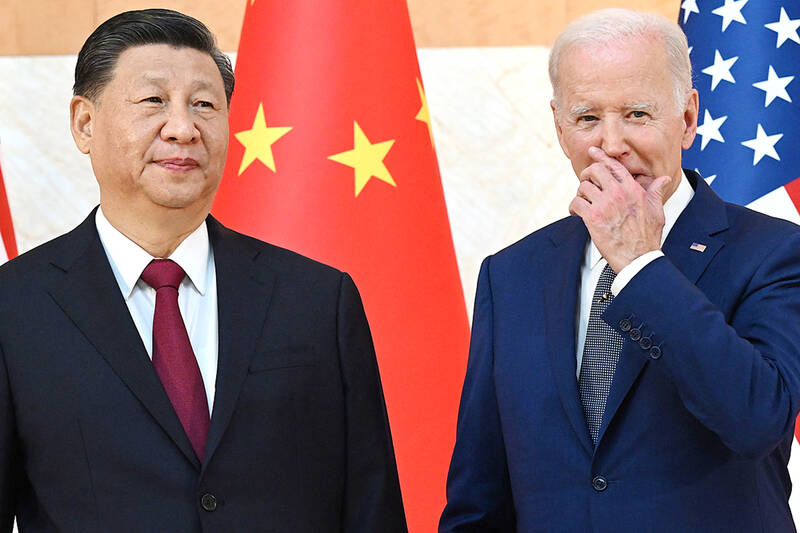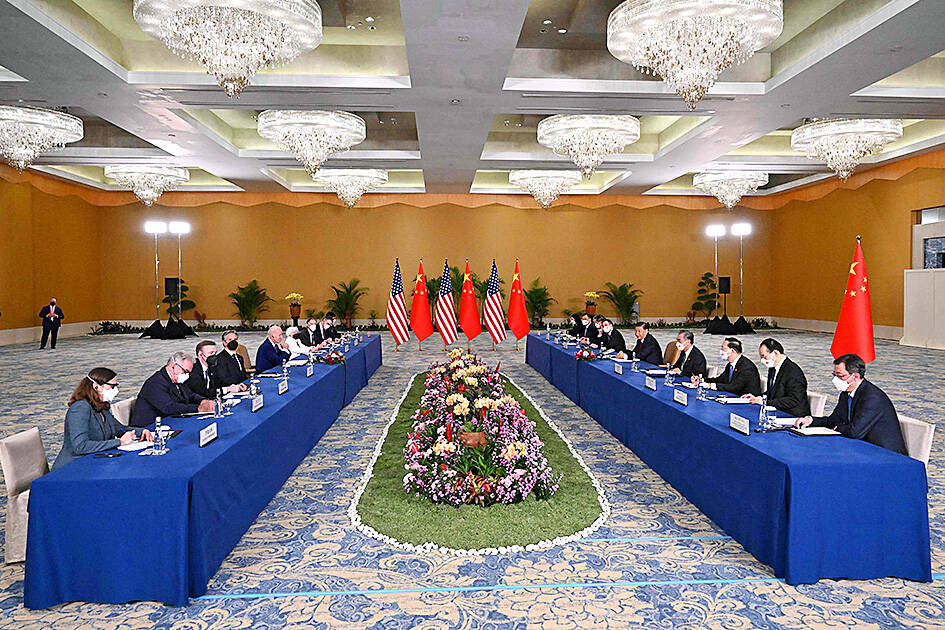US President Joe Biden yesterday objected to China’s “coercive and increasingly aggressive actions” toward Taiwan, and raised human rights concerns about Beijing’s conduct in Xinjiang, Tibet and Hong Kong during his first in-person meeting with Chinese President Xi Jinping (習近平) since he took office, the White House said.
In Taipei, Presidential Office spokesman Xavier Chang (張惇涵) said last night that Taiwan was glad to see Biden reiterate the US’ opposition to unilaterally changing the “status quo” in the Taiwan Strait.
Taiwan will continue its efforts to uphold regional stability and peace with like-minded partners, he added.

Photo: AFP
In a statement after the roughly three-hour session, the White House said Biden told Xi that the US would “continue to compete vigorously” with China, but that “competition should not veer into conflict.”
The meeting came as the superpowers aimed to “manage” differences between them as they compete for global influence amid increasing economic and security tensions.
Biden scheduled a news conference later yesterday to discuss the meeting, which came in the midst of a seven-day, round-the-world trip.

Photo: AFP
Biden and Xi also agreed that “a nuclear war should never be fought” and cannot be won, “and underscored their opposition to the use or threat of use of nuclear weapons in Ukraine,” the White House said.
That was a reference to Russian officials’ thinly veiled threats to use atomic weapons as its nearly nine-month invasion of Ukraine has faltered.
Biden and Xi also agreed to “empower key senior officials” on areas of potential cooperation, including tacking climate change, and maintaining global financial, health and food stability.
It was not immediately clear whether that meant China would agree to restart climate change talks that Beijing had paused in protest of US House of Representatives Speaker Nancy Pelosi’s visit to Taiwan in August.
Xi and Biden greeted each other with a handshake at a luxury resort hotel in Indonesia, where they are attending the G20 summit of large economies.
“As the leaders of our two nations, we share responsibility, in my view, to show that China and the United States can manage our differences, prevent competition from becoming anything ever near conflict, and to find ways to work together on urgent global issues that require our mutual cooperation,” Biden said to open the meeting.
Xi called on Biden to “chart the right course” and “elevate the relationship” between China and the US.
He said he was ready for a “candid and in-depth exchange of views” with Biden.
Both men entered the highly anticipated meeting with bolstered political standing at home. Democrats triumphantly held onto control of the US Senate, with a chance to boost their ranks by one in a runoff election in Georgia next month, while Xi was awarded a third five-year term last month by the Chinese Communist Party’s National Congress.
The White House said Biden specifically mentioned US concerns about China’s actions in Xinjiang, Tibet and Hong Kong, and the plight of Americans it considers “wrongfully detained” or subject to exit bans in China.
It said Biden “raised US objections to the PRC’s [People’s Republic of China’s] coercive and increasingly aggressive actions toward Taiwan, which undermine peace and stability across the Taiwan Strait and in the broader region, and jeopardize global prosperity.”
Xi, according to the Chinese government’s own account of the meeting, “stressed that the Taiwan question is at the very core of China’s core interests, the bedrock of the political foundation of China-US relations, and the first red line that must not be crossed in China-US relations.”
In the meeting, Biden said China’s economic practices “harm American workers and families, and workers and families around the world,” the White House said.
It came just weeks after the Biden administration blocked exports of advanced computer chips to China — a national security move that bolsters US competition against Beijing.

Taiwan is gearing up to celebrate the New Year at events across the country, headlined by the annual countdown and Taipei 101 fireworks display at midnight. Many of the events are to be livesteamed online. See below for lineups and links: Taipei Taipei’s New Year’s Party 2026 is to begin at 7pm and run until 1am, with the theme “Sailing to the Future.” South Korean girl group KARA is headlining the concert at Taipei City Hall Plaza, with additional performances by Amber An (安心亞), Nick Chou (周湯豪), hip-hop trio Nine One One (玖壹壹), Bii (畢書盡), girl group Genblue (幻藍小熊) and more. The festivities are to

Auckland rang in 2026 with a downtown fireworks display launched from New Zealand’s tallest structure, Sky Tower, making it the first major city to greet the new year at a celebration dampened by rain, while crowds in Taipei braved the elements to watch Taipei 101’s display. South Pacific countries are the first to bid farewell to 2025. Clocks struck midnight in Auckland, with a population of 1.7 million, 18 hours before the famous ball was to drop in New York’s Times Square. The five-minute display involved 3,500 fireworks launched from the 240m Sky Tower. Smaller community events were canceled across New Zealand’s

‘IRRESPONSIBLE’: Beijing’s constant disruption of the ‘status quo’ in the Taiwan Strait has damaged peace, stability and security in the Indo-Pacific region, MOFA said The Presidential Office yesterday condemned China’s launch of another military drill around Taiwan, saying such actions are a “unilateral provocation” that destabilizes regional peace and stability. China should immediately stop the irresponsible and provocative actions, Presidential Office spokeswoman Karen Kuo (郭雅慧) said, after the Chinese People’s Liberation Army (PLA) yesterday announced the start of a new round of joint exercises around Taiwan by the army, navy and air force, which it said were approaching “from different directions.” Code-named “Justice Mission 2025,” the exercises would be conducted in the Taiwan Strait and in areas north, southwest, southeast and east of Taiwan

UNDER WAY: The contract for advanced sensor systems would be fulfilled in Florida, and is expected to be completed by June 2031, the Pentagon said Lockheed Martin has been given a contract involving foreign military sales to Taiwan to meet what Washington calls “an urgent operational need” of Taiwan’s air force, the Pentagon said on Wednesday. The contract has a ceiling value of US$328.5 million, with US$157.3 million in foreign military sales funds obligated at the time of award, the Pentagon said in a statement. “This contract provides for the procurement and delivery of 55 Infrared Search and Track Legion Enhanced Sensor Pods, processors, pod containers and processor containers required to meet the urgent operational need of the Taiwan air force,” it said. The contract’s work would be